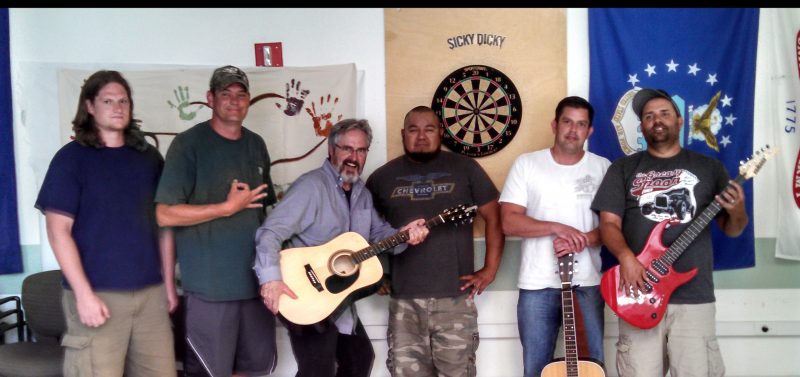Richard Harrell has studied and thought about the power of music and the human singing voice for much of his 70 years. “There is nothing in life that fires up your brain as much as music—nothing!” he’s concluded.
After decades of singing on the opera stage and directing professionally, that insight led him to found and now direct Heroes’ Voices, a nonprofit dedicated to helping veterans cope with Post-Traumatic Stress Disorder. His tools: Music and poetry created by the vets themselves.
Heroes’ Voices, now in its 11th year, hosts guitar classes for vets, singalong sessions, and poetry readings. Before the pandemic restricted in-person events, music therapists, clinical nurses, and psychologists participated in the classes. It works with numerous veterans-focused organizations and hopes to resume in-person visits to imprisoned vets when restrictions are lifted.
Vets are invited to read their poetry during workshops. “It (has been) such a success that we created the National Veterans Poetry Contest, which we ran for three years,” Harrell said. “We were able to publish 40 poems of the semi-finalists, and we made a poetry book.” One of the advisors to the contest was famed poet, Lawrence Ferlinghetti, a vet.
Navy veteran, Robert Kaplan, was a semi-finalist in the program’s first poetry contest.
“Richard and his team have been instrumental in my recovery. They have shown support where I could find no other,” he said. “And they brought me into poetry, which has been my therapy during my early recovery.”
Looking for change
Harrell had a long and successful musical and theatrical career, singing opera, directing plays, and teaching music. He sang professionally for about 10 years and then transitioned to directorships at several major institutions, including the Julliard Opera Center, San Francisco Opera Center, San Francisco Conservatory Opera Program, and the Tokyo Opera Training Program.
But by 2012, he felt burned out and was looking for a new direction. A close friend suggested he might turn his musical talent and experience to a new use: helping veterans.
Although Harrell is not a vet, the advice resonated as he walked through airports and saw the vacant looks and apparent depression on the faces of men and women who were going off to war or returning to their loved ones. “That 1000-yard stare just got to me,” he said.
Within a year, he conceived of Heroes’ Voices and secured its status as a nonprofit. Validation, he said, came quickly. “I was told that there was a veteran in a psychiatric ICU who had not gotten out of bed for five days, who was convinced he would die that day. I shared his favorite tunes for a while, and he got out of bed to make music with me. If you can touch lives like that, then why not?”
Growing gains
The program has grown over the years. It has worked with more than 1,000 vets, and now partners with nearly two dozen veteran-focused health organizations, private foundations, and several musical organizations, including the Oakland Symphony Chorus, and the Warrior Cry Music Project.
Before the pandemic barred in-person visits, Heroes’ Voices staffers and volunteers met with vets at Veterans Administration facilities around the Bay Area as well as in San Quentin prison and the San Francisco County Jail.
Last year, it was a recipient of the Jefferson Award, presented by Multiplying Good, a national nonprofit that honors individuals and organizations for their community service.
Instrumental music, along with singing and poetry, is an important part of Heroes’ Voices.
If a vet wants to learn the guitar but doesn’t own one, they won’t be turned away. Gryphon Strings, a Palo Alto music store, has donated more than 250 used guitars to a Heroes’ Voices program called Guitar Corps.
Larry Chung, a Guitar Corps instructor, said the artistic programs give everyone “a chance to check-in and derive benefit through their own voice, their own poetry and learning an instrument. It’s a way they can express their stories, their personalities, and their being.”
Harrell has significant musical chops. In addition to singing baritone, he plays the piano and guitar. He likes to sing the folk and pop music of his generation — the Beatles and James Taylor among others — but he hasn’t lost his affinity for Mozart. And when he has time, he sings in a church choir.
He teaches voice at Blue Bear School of Music at Fort Mason and has a private practice at his home studio in San Francisco’s Anza Vista neighborhood.
Harrell is the youngest in a family of five with a father who was the city manager in Muskogee, Oklahoma, and a mother who stayed at home. His earliest childhood memories are all centered on music: “My first experiences were in church, then AM radio. I played in garage bands beginning in 7th grade, and was in a high school choir that only did classical music.”
When he is not traveling between the North and South Bay or working out of his office at the Veterans Building on Van Ness, he takes time out with his wife, Lisa, and hikes the trails in Marin, the Presidio, and Golden Gate Park. Harrell and his wife are active in their church, Calvary Presbyterian, where a gala performance was held in March to honor Heroes’ Voices.
“We’ve done various fundraising efforts through the years with some success,” Harrell said. “To really get into serious fundraising you need a professional and enough income to pay them. We muddle along pretty well with very modest funding.”
He wishes that the benefits of Heroes’ Voices could be accessible to every veteran across the country. He said, “All I need is $500,000 to hire the people and that would do it.”

